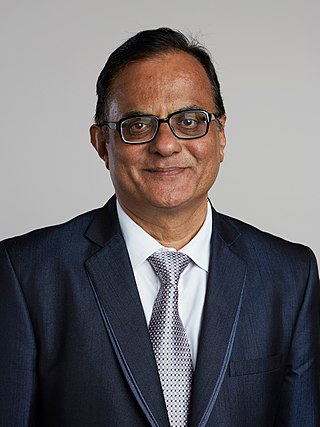Top Qs
Timeline
Chat
Perspective
Ajay K. Sood
Indian physicist (born 1951) From Wikipedia, the free encyclopedia
Remove ads
Ajay Kumar Sood (born 26 June 1951)[1] is an Indian physicist and researcher currently serving as the 4th Principal Scientific Adviser to the Government of India.
This article has multiple issues. Please help improve it or discuss these issues on the talk page. (Learn how and when to remove these messages)
|
He holds 2 United States and 5 Indian patents,[3][4] and is known for his research findings[5] on graphene and nanotechnology.[6][7] He is a Distinguished Honorary Professor of Physics at the Indian Institute of Science, Bangalore.[8] The Government of India honoured him in 2013, with the Padma Shri for his contributions to the fields of science and technology.[9] Sood was elected a Fellow of the Royal Society (FRS) in 2015.[2][10] He has been on the Physical Sciences jury for the Infosys Prize from 2019.[11] He serves as an Associate Editor for ACS Nano.[12]
Remove ads
Biography
Summarize
Perspective
The sound of music is also deep physics. Of course, you don't need to know that to appreciate music says Dr. Ajay K. Sood.[13]
Ajay Kumar Sood was born on 26 June 1951,[5] in Gwalior, India.[1][3] He graduated in physics (BSc Hons)[5] from the Punjab University, Chandigarh, in 1971, and followed it with a master's degree, (MSc Hons)[5] a year later, from the same university. In 1973, he joined the Indira Gandhi Centre for Atomic Research, Kalpakkam, as a scientist where he worked till 1988. During this period, he enrolled for research at the Indian Institute of Science from where he obtained his PhD, in 1982. He also did post doctoral research at the Max Planck Institute für Festkörperforschung, Stuttgart, Germany, from 1983 to 1985.[3][13]
The Indian Institute of Science (IISc) offered Sood the post of an associate professor at the institution in 1988,[5] which he accepted. In 1994, he was promoted as the Professor of the Department of Physics at IISc.[5][7][14] Four years later, he rose to the position of the chairman of the Division of Physical and Mathematical Sciences, IISc, which he held until 2008.[5] Sood has also been holding the position of the honorary professor at the Jawaharlal Nehru Centre for Advanced Scientific Research, Bengaluru since 1993.[3][5][6]
Sood lives in Bengaluru, Karnataka state, India, associating himself with the Indian Institute of Science and the Jawaharlal Nehru Centre for Advanced Scientific Research.[3]
Remove ads
Research and legacy
Sood has done research on hard condensed matter and soft condensed matter physics, with special emphasis on Raman scattering and nanotechnology.[5][dead link][13]
Research on resonance Raman studies
Sood, along with his team of scientists at the Indian Institute of Science, has done experiments on semiconductor superlattices, fullerenes, solid C60, C70[15] and single walled carbon nanotubes and optical phonons.[5][16][17] They was successful in exciting squeezed phonon states in KTa03 crystals using femtosecond laser pulses and employing impulsive simulated Raman scattering.[5][18] He has also shown that liquid flow in a singled walled carbon nanotube induces the voltage and current to flow along the floor direction of the tube.
Other research efforts
Sood has also experimented with soft condensed matter like micelle composed viscoelastic gels.[5][19] He developed an ultrasensitive immunoassay by subjecting colloids to an electrical field, thus generating nonequilibrium phenomena.[5][13] He has developed a medical diagnostic kit.[13]
Sood is now working on the modalities of enhancing the viscosity of a material by adding nanotubes without increasing its weight.[13]
Remove ads
Academic fellowships and positions
Sood is a fellow of science academies and institutions such as the Indian Academy of Sciences (FASc)[5] (1991), the Indian National Science Academy (FNA) (1996), The World Academy of Sciences (FTWAS)[5] (2002) and the National Academy of Sciences, India (FNASc)[5] (1995)[4][5] and holds the Bhatnagar Chair of the Council of Scientific and Industrial Research.[4] He is the incumbent Secretary General of The World Academy of Sciences[20] and a former President of the Indian Academy of Sciences from 2010 to 2012[4] and the vice-president of the Indian National Science Academy from 2008 to 2010. He also served as a member of the Asia-Pacific Academy of Materials[21] in 2008.[3]
Sood was an executive editor of Solid State Communications.[22] He is also an editorial board member of the journals, Scientific Reports, Particle[23] and EPL (Europhysics Letters).[24]
Sood has served on the scientific advisory committee to the Prime Minister of India from 2009 to 2014,[13] and is the Chairman of the National Physical Laboratory, New Delhi.[3]
Awards and recognitions
He was awarded Shanti Swarup Bhatnagar Prize, in 1990, by the Government of India.[3][4][5] In 2013, the Government of India followed it up with the fourth highest civilian award, Padma Shri.[9]
The Third World Academy of Sciences (TWAS) recognised Sood's services by conferring on him the TWAS Prize in Physics, in 2000.[4][5] The same year, he received four more awards viz. G. D. Birla Science Award,[5] Federation of Indian Chambers of Commerce and Industry (FICCI) Award,[4][5] Materials Research Society (India) Medal and Millennium Gold Medal of Indian Science Congress.[4][5] Two years later, in 2002, he received the Homi Jehangir Bhabha Medal of Indian National Science Academy.[4][5] The next year, in 2003, he was selected for the Indian Institute of Science (IISc) Alumni Award for Excellence in Research for Science. Three more awards came his way the same year, viz. M. N. Saha Birth Centenary Award of the Indian Science Congress,[4][5] Sir C. V. Raman Award of the University Grants Commission[4][5] and the Goyal Prize in Physics.[3][4][5] Sood was elected a Fellow of the Royal Society (FRS) in 2015.[2]
Remove ads
See also
References
Further reading
External links
Wikiwand - on
Seamless Wikipedia browsing. On steroids.
Remove ads

